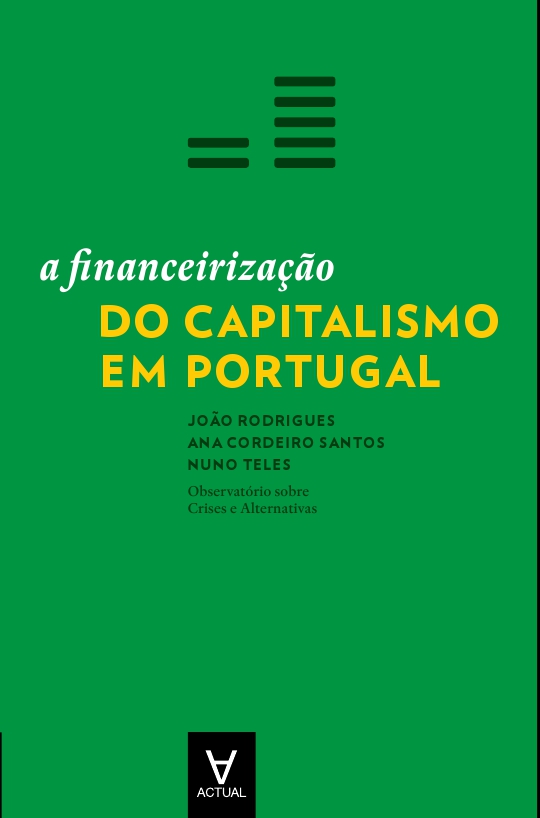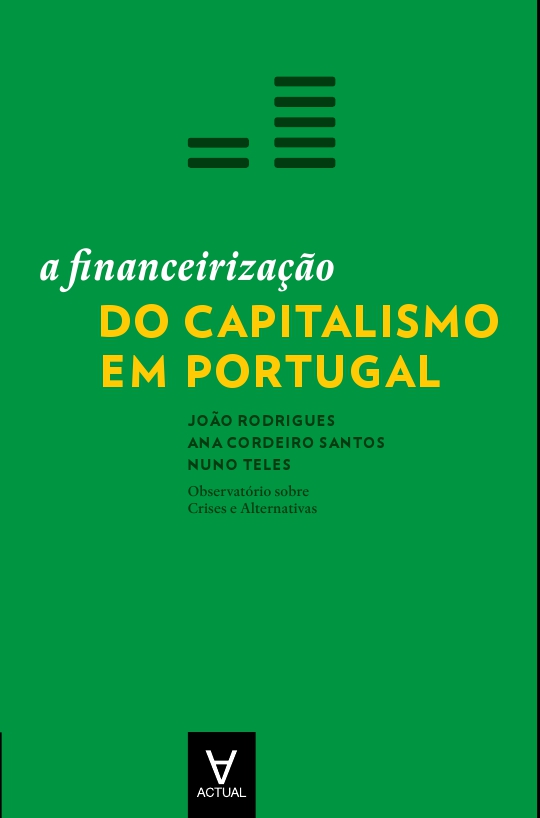Book presentation
"A Financeirização do Capitalismo em Portugal" by João Rodrigues, Ana Cordeiro Santos, Nuno Teles
March 10, 2016, 18h00
Almedina Arrábida Shopping (Porto)
Observatory on Crisis and Alternatives/CES | Actual 2016
With Jorge Bateira, Professor at the Faculty of Economics, University of Coimbra, and Manuel Loff, Professor at the Faculty of Arts and Humanities, University of Porto
Synopsis

This book is the first political economy approach on the financialization of capitalism in Portugal, challenging the conventional economic knowledge, which has long overshadowed the pernicious effects of this process, reducing it to a benign "financial modernisation”. Prolonged stagnation and economic crisis demand a break from this ideological vision.
The book's main thesis is as follows: the evolution of capitalism in Portugal during the last three decades has witnessed the rise of finance, in general, and private banking, in particular, shaping the main socio-economic and political dynamics of the country since then. This was an international process that, in the specific case of Portugal, is liable to the European integration that ultimately culminated in a dysfunctional Euro.
This is the second annual report of the Observatory on Crisis and Alternatives of the Centre for Social Studies, University of Coimbra.
About the authors
João Rodrigues, economist, researcher at the Research Group on Science, Economy and Society of the Centre for Social Studies and lecturer at the Faculty of Economics, University of Coimbra. He studied for his Ph.D., entitled "Are Markets Everywhere? Ludwig von Mises, Friedrich Hayek and Karl Polanyi", at the University of Manchester. His research interests include topics of political economy, from the history of neoliberalism to the recent Euro crisis. He has published several works in these areas.
Ana Cordeiro Santos is researcher at the Science, Economy and Society Research Group (NECES) of the Centre for Social Studies(CES). She received her Ph.D. from the Erasmus University of Rotterdam, The Netherlands, and her Masters from the University of Roskilde, Denmark. She has a Bachelor Degree in Economics from the Technical University of Lisbon. Her research interests include methodology of economics, experimental economics and behavioural economics and she has published on these topics in various journals. She has recently started working on the topics of financialisation and household indebtedness. She is the author of "The Social Epistemology of Experimental Economics", London: Routledge (2010).
Nuno Teles is a researcher at the Science, Economy and Society Research Group (NECES) of the Centre for Social Studies(CES). He received his Ph.D. from the School of Oriental and African Studies (SOAS), University of London) and his Masters from the University of Paris XIII. His research interests include development economics and the financialisation of the economy. He is now working in the European Project FESSUD (Financialisation, Economy, Society and Sustainable Development). He is a member of the Research on Money and Finance (RMF), being one of the authors of the book Eurozone in Crisis (Verso, 2012)


